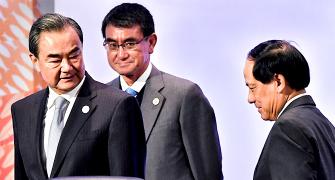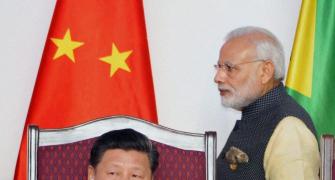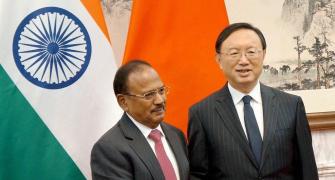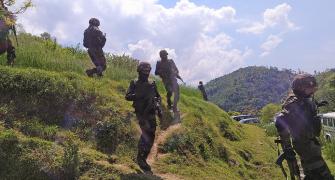'The situation in Doklam has plateaued; militarily, the Chinese know they can do nothing here,' an Indian general tells Ajai Shukla.
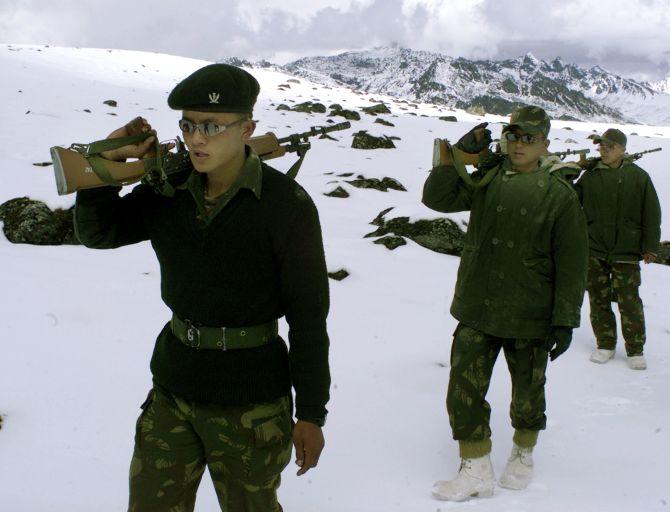
With China's defence ministry warning New Delhi that 'restraint has its bottom line', Indian Army officers participating in the Doklam faceoff have provided first detailed accounts of how the situation has evolved.
They say the Doklam bowl -- which is disputed between China and Bhutan -- currently has an extended, 200 metre-long line of Indian infantry soldiers confronting a smaller number of Chinese border guards.
Just one metre separates the two lines.
At any time, there are about 40 Chinese border guards in the disputed valley, facing off against three times that number of Indian jawans.
Backing up the Chinese front line are 1,500 more troops, a mix of border guards and regular People's Liberation Army soldiers.
These are positioned outside the disputed Doklam area, but cross in and out of the disputed area, relieving those on the front line at regular intervals.
Indian troops standing guard in Doklam are similarly relieved by a full infantry battalion (600 troops), located in the Indian territory to the west.
Backing up this battalion is a full infantry brigade (2,000 troops), ready to respond to any military moves from China.
In addition, a second fully acclimatised infantry brigade, slightly further away, stands ready to respond to a crisis.
"We fortunately had two brigades training in high altitudes nearby, so we have plenty of acclimatised troops. If needed, we can muster far more forces than the Chinese in Sikkim. This would never be an area where they start something," says a senior Indian commander.
According to these officers, tension began in early June, when Indian forces in the vicinity observed Chinese patrols reconnoitring the track in the disputed Doklam bowl.
Intelligence assessments concluded that China was going to try and extend the road towards the Jampheri Ridge, at the farthest edge of China's claim line.
Indian commanders strongly rejected the statement by China's foreign ministry, which claimed that India had been notified on May 18 and June 8, 'out of goodwill through the border meeting mechanism', that China would be building a road in Doklam.
They say, the Indian Army reported to Delhi that road building seemed imminent, and were granted permission to cross into Bhutan-claimed territory to stop construction.
When India crossed into Doklam and confronted the Chinese construction parties, "they were taken completely by surprise and offered no resistance," says an officer privy to events.
"These are no soldiers; they are conscripted border guards, who live in heated barracks and periodically patrol the border in vehicles. They don't walk much," says an Indian commander.
"Our soldiers, in contrast, live a far tougher life. In Doklam, they stand guard without moving, while the Chinese keep breaking the line and going back for cigarette breaks," says the Indian officer.
"Indian morale is sky-high; soldiers know they are participating in something unprecedented -- crossing a border to defend an Indian ally," the Indian officer adds.
Eventually, the Chinese had to send in a political commissar, recount Indian officers.
"The commissar ordered up martial music and the hoisting of Chinese flags to stiffen resolve. They clearly had problems," he says.
In the macho manner of militaries, the Indian Army is using a large number of Sikh and Jat soldiers to man the line in Doklam -- in the expectation that their height and sturdiness would intimidate the smaller Chinese.
Army officers are elated also at having kept the confrontation out of the media for a full 10 days until Beijing was forced to make the incident public.
"The Chinese have always complained that India's media is too shrill and pro-active. This time, China had to mobilise their media because we were there on the ground and nobody knew."
Indian soldiers also point out that China has begun building bunkers and creating defences on the border.
"That's another first. They are recognising our capability to act decisively," says an officer.
According to a senior Indian general: "The situation in Doklam has plateaued. Militarily, the Chinese know they can do nothing here. Eventually it will have to be a negotiated withdrawal, or the Chinese will have to open a front in another sector."
With Beijing warning last week that 'Chinese armed forces will resolutely protect the country's territorial sovereignty and security interests,' the PLA could choose its next move anywhere on a long, 3,500-kilometre border that stretches from Ladakh to Myanmar.


